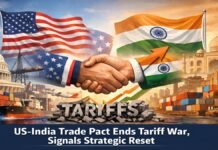
Key Points
- Trump threatens 25% tariff on Apple if iPhones for US aren’t made domestically
- Apple rapidly expanding iPhone production in India to reduce reliance on China
- Experts warn US manufacturing would dramatically raise iPhone prices, possibly up to $3,500 per unit
- Apple’s India output set to double, with Foxconn and Tata Electronics leading the charge
- Analysts say Apple likely to absorb tariffs rather than shift full-scale production to the US
- Apple’s shares fell after Trump’s announcement, reflecting investor concerns
Washington, DC: In a bold escalation of his “America First” trade policy, President Donald Trump on Friday warned Apple that it must manufacture iPhones sold in the US domestically or face a steep 25% tariff. The ultimatum, delivered via a post on Truth Social, comes as Apple accelerates its shift of iPhone production from China to India amid ongoing trade tensions and supply chain risks.
Apple’s India Expansion Under Scrutiny
Apple has been rapidly diversifying its manufacturing base, with India emerging as a key hub. Foxconn, Apple’s top supplier, is investing $1.5 billion in a new plant near Chennai, and Tata Electronics has acquired a majority stake in Pegatron India, further strengthening India’s position in Apple’s global supply chain. In 2024, India produced about 18% of the world’s iPhones, a figure expected to rise to 32% by 2025. Apple exported iPhones worth a record ₹1.5 trillion ($18 billion) from India in 2024–25, doubling its previous year’s output.
Trump’s Pressure and Apple’s Dilemma
Trump’s post made it clear that Apple CEO Tim Cook was warned about this policy shift: “I have long ago informed Tim Cook of Apple that I expect their iPhones that will be sold in the United States of America will be manufactured and built in the United States, not India, or anyplace else. If that is not the case, a Tariff of at least 25% must be paid by Apple to the US”.
The threat comes as Apple plans to make the majority of iPhones for the US market in India, with Cook acknowledging that India will soon be the primary source for US-bound iPhones. Despite Trump’s repeated warnings, Apple continues to expand its Indian operations, with Foxconn and Tata ramping up capacity and new plants coming online.
Economic Realities: Can Apple Move Production to the US?
Experts say shifting iPhone manufacturing to the US would be a logistical and financial challenge. Building the sophisticated supply chain Apple relies on in the US could take years and would multiply costs. Labor, operations, and logistics in the US are far more expensive than in India or China. Estimates suggest the cost to manufacture an iPhone in the US would be nearly four times higher than in India, potentially pushing retail prices to $2,000–$3,500 per device.
Wedbush Securities projects that if Apple moved all iPhone production to the US, the base model could cost as much as $3,500, compared to the current $799. This would likely make iPhones unaffordable for many consumers and could severely impact Apple’s sales and market share.
Apple’s Likely Response
Industry analysts believe Apple is more likely to absorb the cost of tariffs than to relocate its entire supply chain to the US, as the latter would be economically unviable and time-consuming. UBS analyst David Vogt estimates that a 25% tariff would reduce Apple’s annual profits but would be a “minor challenge” compared to the cost and complexity of moving production.
Market Reaction and Global Impact
Following Trump’s announcement, Apple’s shares dropped by up to 3%, erasing nearly $100 billion in market value and dragging US stock indices lower. The move has also sparked concerns about the broader impact on global supply chains and the future of US–India and US–China trade relations.
The Road Ahead
While Trump’s demand underscores his commitment to domestic manufacturing, the reality is that Apple’s global supply chain is deeply entrenched in Asia, with India now the most viable alternative to China. US manufacturing, while theoretically possible, remains impractical due to high costs and the lack of a comparable ecosystem.
Trump’s tariff threat has put Apple’s global strategy under the microscope, but the economic and logistical hurdles of US-only production make a dramatic shift unlikely in the near term. Apple’s India expansion is expected to continue, even as the company braces for potential tariff impacts and market volatility.





















































